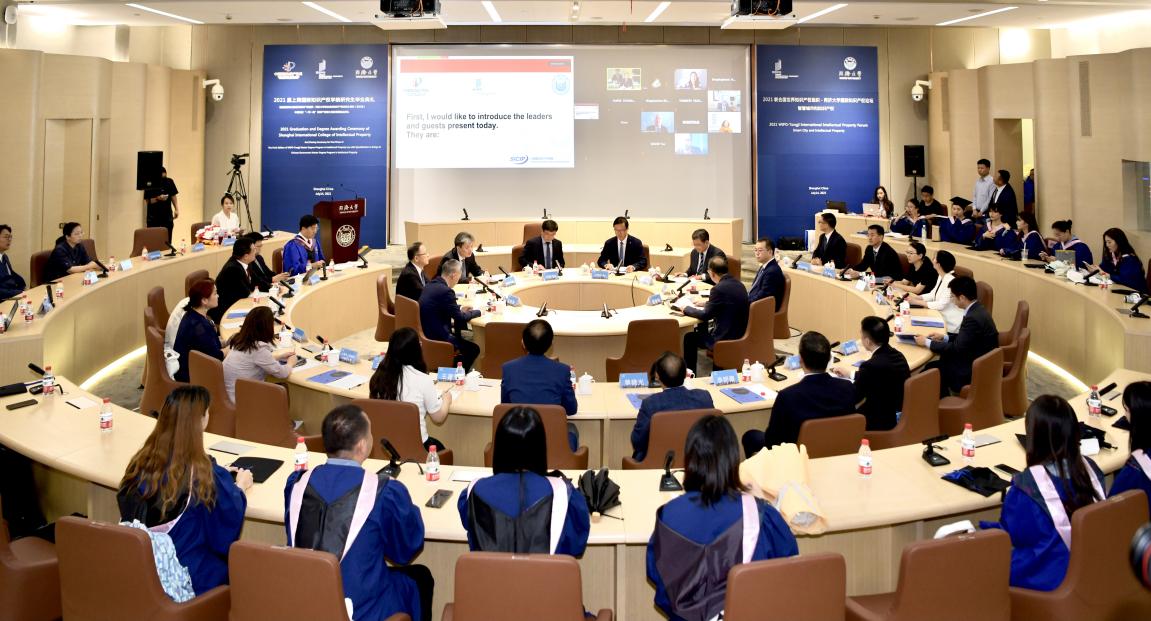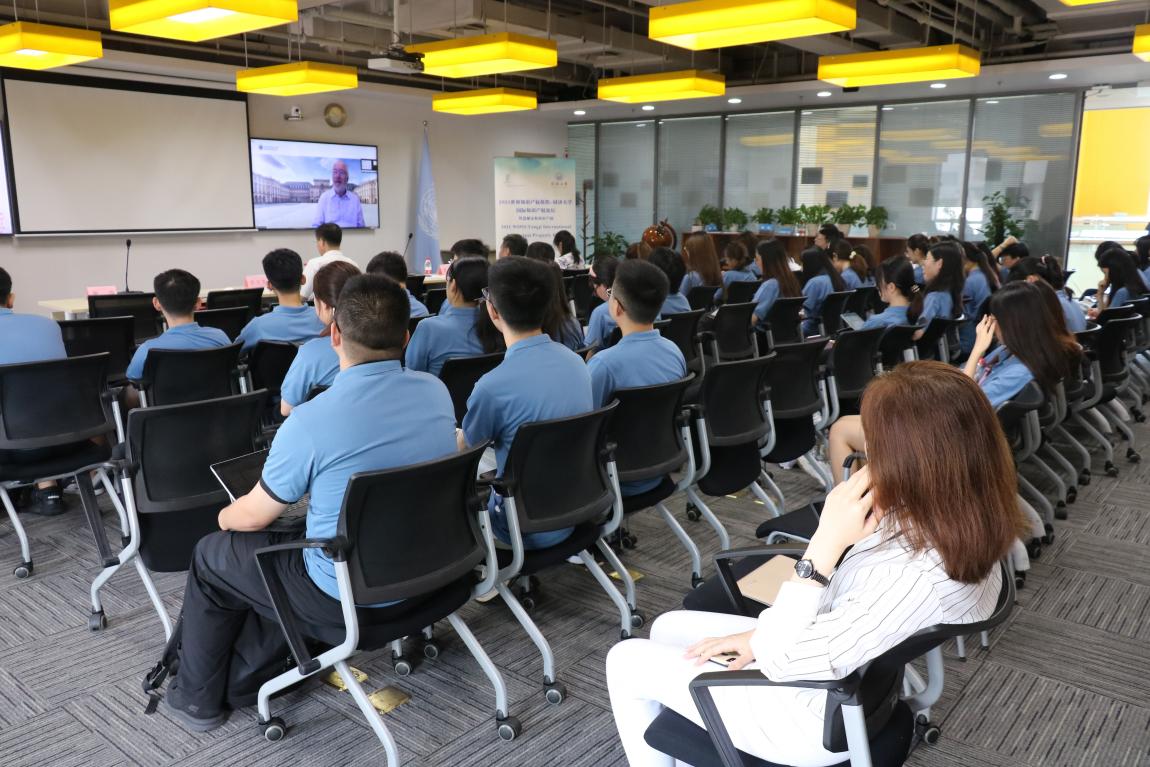

During July 12-15, the four-day World Intellectual Property Organization (WIPO)-Tongji International Intellectual Property Forum was held successfully.
More than 100 experts and scholars from Chinese and international universities and institutions, including WIPO, University of Munich, University of Mannheim, University of Amsterdam, University of Augsburg, University of Würzburg, ESSEC Business School, University of Copenhagen, University of Tokyo, the University of Western Australia, Fudan University and the Third Branch of the Shanghai Municipal People's Procuratorate, and postgraduates of WIPO-Tongji Joint Master's Degree Program in Intellectual Property and "Belt and Road" Master's Degree Program in Intellectual Property from 17 countries, were invited to attend the forum.
The forum was divided into two parts, the International Workshop of WIPO-Tongji and Chinese Government Intellectual Property Master Program Students and the WIPO-Tongji International Intellectual Property Forum with a topic of "Smart City and Intellectual Property." During the forum, the signing ceremony of the second edition of the Memorandum of Understanding for the WIPO-Tongji Joint Master's Degree Program in Intellectual Property, the graduation ceremony of the 2021 SICIP postgraduate students, and the summer school were also held.

In the Workshop of WIPO-Tongji and Chinese Government Master Program Students, more than 40 Chinese and international students of WIPO-Tongji Master's Degree Program in Intellectual Property reported their research results over the past year. They discussed various issues, including NFT artwork copyright protection, IP public interest litigation, standard-essential patent litigation system, and open-source software license. International students from many Laos, Ethiopia, and other regions conducted comparative analyses of the IPR system construction issues in their areas. Each teaching & research group prepared actively, and the teachers made detailed comments on each student's topic, methodology and conclusions.
Module 1 of the WIPO-Tongji International Intellectual Property Forum has themed "Small and medium-sized enterprises and intellectual property in the context of the digital economy." Prof. Naigen Zhang moderated it from Law School of Fudan University, Prof. Martin Senftleben from the University of Amsterdam, Prof. Matthias Leistner from the University of Munich, Prof. Mingde Li from CASS, Associate Professor Dr. Jie Hua and Associate Professor Dr. Ming Xu from SICIP, Tongji University, presented the latest studies on data protection for SMEs, the latest EU regulations on digital markets and digital services, and copyright issues for SMEs.
Module 2 of the forum was themed "Industry-university-research cooperation and intellectual property operation in smart cities" and was moderated by Prof. Hao Mao from SICIP, Tongji University. Prof. Kazuyuki Motohashi from the University of Tokyo examined the local industry influence on the commercialization of university research by university start-ups by associating Japanese research data on university start-ups with Japanese patent data. Prof. Sen CHAI from ESSEC Business School conducted a test on the effect of industry-university research sponsored by the Danish National Advanced Technology Foundation. It assessed the impact of refunded projects on firm innovation performance. Associate Professor Dr. Jianwei Dang from SICIP, Tongji University, presented the latest research on the effects of university relocation on technology spillovers.
Module 3 of the forum was themed "Health protection and intellectual property issues in the biotechnology and pharmaceutical industries." It was moderated by Prof. Lixian Cong from East China University of Political Science and Law. Prof. Jochen Taupitz, Academician of European Academy of Sciences, Director of the Institute for German, European and International Medical Law and Bioethics and Professor at the University of Mannheim discussed with the title of Liability for Damages caused by Artificial Intelligence (AI) in Medicine, about the developments and challenges of AI in the medical field. Prof. Jochen Taupitz believed that artificial intelligence has great potential for disease diagnosis and treatment, but there are substantial legal risks and concerns. Dr. Bostyn Sven, Associate Professor at the Center for Advanced Studies in Biomedical Innovation Law of the University of Copenhagen, discussed the title of "Intellectual property rights and health: Lessons to be learned from the pandemic for the future about the IP protection related to the pandemic. Dr. Su Qi, Associate professor at SICIP, Tongji University, presented an empirical study of patent protection on the impact of technology innovation in China's pharmaceutical industry. Dr. Li Jiang, Associate Professor at SICIP, Tongji University, introduced China's recent laws and regulations on pharmaceutical patent linkage and believes that China's unique administrative approach will play a more significant role in resolving disputes between generic drug companies and original research drug companies.
Module 4 of the forum was themed "Criminal law protection for smart cities" and was moderated by Dr. Yan Xie, Associate professor at SICIP, Tongji University. Prof. Eric Hilgendorf from the University of Würzburg presented the debate in Europe on the regulation of AI through law. Prof. Yong Pi from SICIP, Tongji University discussed the balanced protection of criminal law for personal information. Prof. Johannes Kaspar from the University of Augsburg analyzed the benefits and disadvantages of different technical solutions for digital sentencing and the path to improvement. Mr. Feng Lu, Prosecutor of the third branch of the Shanghai Municipal People's Procuratorate, introduced the developments and challenges of network crime in China. In the following section of questions and discussions, Dr. Chang Liu, Assistant Researcher at SICIP, Tongji University, and several students had an academic debate with the four speakers.







 0086-021-65983113
0086-021-65983113  sicip_intoff@tongji.edu.cn
sicip_intoff@tongji.edu.cn